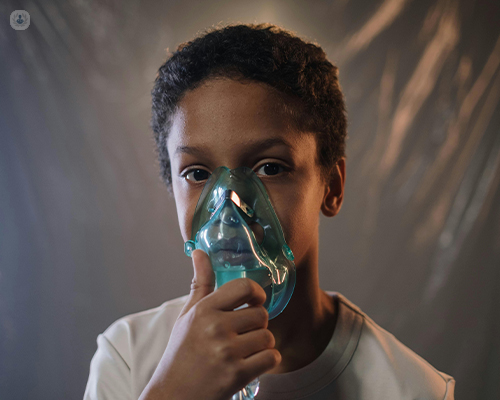Cough and breathing problem in children: what to do for issues in little lungs
Written in association with:Parents may feel uneasy when hearing their young children cough or have breathing problems. There is a wide variety of causes for such issues, ranging from benign to far more serious. In this article, leading consultant paediatrician Dr Abraham Neduvamkunnil explains why coughing and breathing problems are not all unexpected in children, and how to tell if their condition is serious.

Children’s immune systems are still developing, which leaves them vulnerable to frequent colds throughout the year, especially once they’ve started schooling and they are in contact with other children. It is normal for a child to have a cold around eight times a year, and it’s a good way for them to build up their immune system against common pathologies. However, during these times, the child will be struggle with frequent coughing and congestion leading to irregular breathing.
What do coughing and breathing problems mean in children?
Coughing is not so much a symptom as it is the body’s reaction to a symptom. Coughing helps to expel mucus, phlegm, or other blockages from the airways, throat, and chest. Breathing problems, namely wheezing, can also stem from those same blockages. Other symptoms that may also occur are a runny nose and a high temperature, which are all indicative of a cold, flu, and other viral infections. Allergies are another possible cause of coughing but note that in the case of allergies, the child should not have a high temperature.
Most colds should get better within a week or two (called an acute cough), and do not require any antibiotic treatment or significant medical intervention.
When is a cough or breathing problem in children serious?
Any cough lasting for more than two weeks (a persistent or chronic cough) may be cause for concern and require a doctor’s evaluation, for illnesses such as:
- Asthma, a lifelong condition in which the airways are inflamed and narrow, which occasionally can belabour breathing, especially when the child is physically exerting themselves. If left unaddressed or if appropriate accommodations are not made, then the breathing issues can lead to chronic fatigue and children may be excluded from activities in school or play.
- Whooping cough, a contagious respiratory tract infection, is named after the sound of the inhaled breath right before a fit of coughing. Children, especially babies under a year old, can be in danger with this condition, as it can lead to fits, pneumonia, and dehydration. There is a vaccine for this infection and it is recommended.
- Pneumonia, an infection where the lungs are inflamed and the alveoli fill with fluids. It will cause coughing and can cause severe breathing issues. It normally takes a month to run its course, but younger people can experience more adverse effects and will need antibiotics to help them fight the infection.
Breathing issues, where the breathing is wheezy, are not the same as an episode of not being able to breathe entirely. That can be caused by choking on something in the throat or an aggravated asthma attack, and will need immediate emergency medical attention.
How are coughing or breathing problems in children diagnosed?
For serious infections and chronic coughing, children should be taken to see a doctor for a diagnosis and to formulate a treatment plan. A doctor will conduct a physical exam – listening to the child’s breathing, seeing into their throat, nose, and ears, and reviewing their medical history – and may conduct other tests such as blood work, spirometry (which measures how much air can be exhaled in one breath), or imaging scans like an X-ray or a CT scan to check the physical condition of the lungs and sinuses.
How are coughing or breathing problems in children treated?
Medicinal treatment will depend on the cause of the coughing or breathing issues, such as:
- Antihistamines, corticosteroids and decongestants. These medicines are standard treatment for allergies and postnasal drip.
- Inhaled asthma medicines. The most effective treatments for asthma-related cough are corticosteroids and bronchodilators. They reduce inflammation and open up the airways.
- Antibiotics. If a bacterial, fungal or mycobacterial infection is causing the coughing, doctors may prescribe antibiotic medicines for the infection.
- Lozenges and cough medicines. These can ease a dry cough and help with irritation in the throat, but will not address the root condition. These can be bought without a prescription, but are only recommended for children over five years old.
Keeping your child hydrated and the air around them moist (such as with a steamy shower or an air humidifier) can help lubricate the throat and ease their respiratory issues, especially if they are dealing with a common cold or hay fever.
If your child is coughing blood, choking, if their mucus smells bad, or if they are unable to take in air at all, they should be brought to a doctor as soon as possible.
If your child is struggling with coughing and breathing issues, you can consult with Dr Neduvamkunnil today via his Top Doctors profile.


